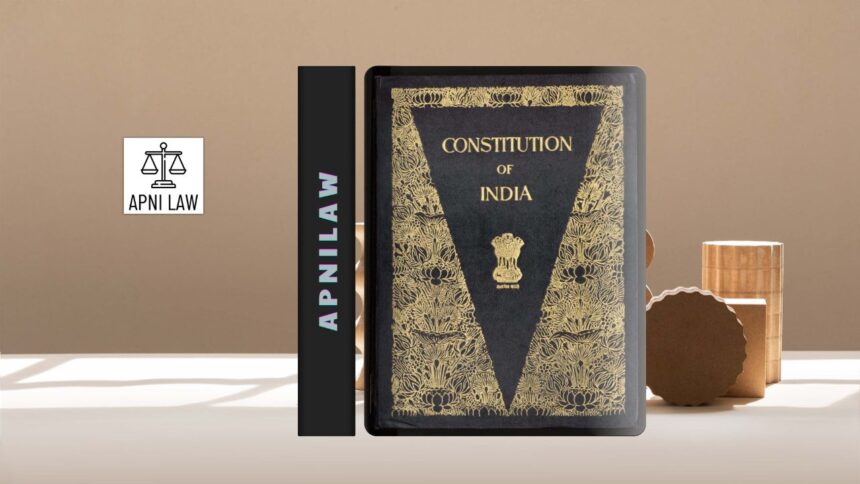Introduction
The Indian Constitution places equality at the heart of democracy. Among all the Fundamental Rights, Article 14 is perhaps the most significant because it establishes the principle that no one is above the law. It guarantees equality before the law and the equal protection of laws to every person within Indian territory. By doing so, it prevents arbitrary action and ensures fairness in governance.
This Article has shaped India’s legal system and continues to influence social and political debates. Understanding Article 14 is essential to see how the Constitution balances fairness with the realities of social inequality.
Meaning of Equality Before Law
“Equality before law” comes from the British constitutional tradition. It means that every individual, regardless of wealth, power, caste, gender, or religion, is subject to the same law. No citizen, leader, or authority stands above the law.
For example, if a minister or a government official breaks a law, they face the same consequences as an ordinary person. This principle strengthens the rule of law and prevents arbitrary decisions by those in power.
Meaning of Equal Protection of Laws
The second part of Article 14, “equal protection of laws,” is inspired by the American Constitution. While equality before law stresses uniform treatment, equal protection allows the State to treat people differently when circumstances demand fairness.
For instance, the law may provide special protections for women, children, Scheduled Castes, Scheduled Tribes, or economically weaker groups. Such distinctions are not violations of equality; rather, they ensure justice in a society where historic inequalities exist.
Reasonable Classification
Article 14 does not mean that the law must treat everyone in exactly the same way. Instead, it allows for reasonable classification. This means the State can create categories of people if there is a just and logical reason. However, such classification must not be arbitrary.
For example, a law giving free education to children up to a certain age is valid. Similarly, special policies for farmers or laborers are justified because they address unique circumstances. On the other hand, if the State discriminates without any logical basis, courts can strike it down.
Landmark Judgments on Article 14
The Supreme Court has expanded the scope of Article 14 through many important judgments.
In State of West Bengal v. Anwar Ali Sarkar (1952), the Court held that classification must not be arbitrary and should have a rational link with the purpose of the law.
In E.P. Royappa v. State of Tamil Nadu (1974), the Court gave a new dimension to equality by declaring that arbitrariness itself is a violation of Article 14. Equality and arbitrariness, the Court said, are sworn enemies.
Later, in Maneka Gandhi v. Union of India (1978), the Court ruled that fairness, reasonableness, and non-arbitrariness are essential components of Article 14. This judgment expanded the meaning of personal liberty under Article 21, but it also showed how Article 14 forms the foundation of fairness in all laws.
Practical Impact of Article 14
Article 14 has practical implications in daily life. Laws relating to taxation, employment, education, and social welfare must comply with equality principles. If any law or government policy is discriminatory without reason, courts can strike it down using the power of judicial review under Article 13.
This provision also ensures that minorities, disadvantaged groups, and weaker sections of society receive protection. For example, reservation policies in education and employment are justified under Article 14 as they aim to achieve substantive equality.
Limitations of Article 14
While Article 14 is powerful, it is not absolute. The Constitution permits the State to make special laws for disadvantaged groups. Courts allow reasonable classification, but they also draw limits. Any classification must satisfy two tests:
- It must be based on an intelligible differentia, which means a clear distinction exists between the groups.
- This differentia must have a rational connection with the objective of the law.
If these two conditions are not met, the law becomes discriminatory and violates Article 14.
Contemporary Relevance
Article 14 continues to play a vital role in modern India. Issues like gender equality, LGBTQ+ rights, and protection of marginalized groups have all found strength in this provision. The Supreme Court’s judgment in Navtej Singh Johar v. Union of India (2018), which decriminalized homosexuality, relied heavily on Article 14.
Similarly, debates around economic reservations and policies like the 103rd Constitutional Amendment (2019), which introduced reservations for Economically Weaker Sections (EWS), also revolve around Article 14’s guarantee of fairness and non-discrimination.
Frequently Asked Questions
What is Article 14 of the Indian Constitution?
Article 14 guarantees equality before law and equal protection of laws to every person in India, ensuring fairness and non-arbitrariness.
Does Article 14 allow reservations?
Yes. Article 14 permits reasonable classification, so reservations for backward classes, Scheduled Castes, Scheduled Tribes, and Economically Weaker Sections are valid.
Why is Article 14 important?
It ensures that the law applies equally to everyone while allowing fair treatment of disadvantaged groups. It is the foundation of justice and democracy in India.
Conclusion
Article 14 is more than a constitutional provision, it is the lifeline of India’s democracy. By combining equality before law with equal protection of laws, it creates a balance between uniformity and fairness. Courts have interpreted it as a safeguard against arbitrariness and discrimination, making it a tool for justice in a diverse nation.
From the abolition of untouchability to modern debates on gender and digital rights, Article 14 has remained relevant across decades. It continues to ensure that India moves closer to its constitutional promise of justice, liberty, and equality for all.
For any specific query call at +91 – 8569843472







